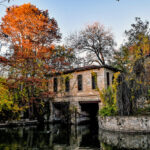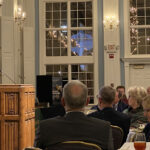Texas Baptists’ Christian Life Commission filed a legal brief urging the Texas Supreme Court to refrain from overly narrowing the scope of the Religious Service Protections amendment to the Texas Constitution.
The CLC filed the amicus brief Dec. 30 in response to oral arguments on the religious freedom case Perez v. City of San Antonio.
John Litzler, CLC director of public policy, explained the case involves the Religious Services Protections amendment to the state constitution.
Voters approved the amendment in 2021 in response to restrictions imposed by local governments on religious services during the COVID-19 pandemic.
Background
The lawsuit concerns the City of San Antonio’s development plan for Brackenridge Park—a city-owned park surrounding a bend in the San Antonio River where Native Americans have an ancestral connection and have worshipped for hundreds of years.
The suit, brought by Gary Perez and Matilde Torres, asserts the city’s plan would prevent the free practice of their religion by preventing them from performing ceremonies essential to their beliefs.
The original opinion in the case was filed April 11, 2024. The U.S. Court of Appeals for the Fifth Circuit held the appellants’ argument lacked merit, affirmed the district court’s judgment and denied an emergency injunction pending appeal to stop the city’s public improvements in the Lambert Beach area of the park.
The Fifth Circuit Court later withdrew its opinion and certified a question to the Supreme Court of Texas to interpret the Religious Services Protections amendment for the first time.
Perez and Torres—ceremonial leaders of the Lipan-Apache Native American Church—sued the city citing the free exercise clause of the U.S. Constitution’s First Amendment, the Texas Religious Freedom Restoration Act and the Texas Constitution.
Sign up for our weekly edition and get all our headlines in your inbox on Thursdays
The suit sought to require the city to grant them access to the area for religious worship, minimize tree removal and allow birds to nest there.
“Following a preliminary injunction hearing, the district court ordered the City to allow Appellants access to the area for religious ceremonies but declined to enjoin the City’s planned tree removal and rookery management measures,” a report on FindLaw explains.
At issue is access to the Lambert Beach area—which will be limited during renovation to the San Antonio River retaining-wall—and the removal of many trees in that section of the park to allow for construction and discourage cormorant nesting in the area where people frequently concentrate.
The Lipan-Apache Native American Church—which blends Native American and Christian beliefs—consider the waters, trees, birds and constellations above the bend in the river a “sacred ecology.”
Perez and Torres contend relocating the birds and removing the trees will prohibit them from performing religious ceremonies dependent on the “sacred ecology” of the riverbend—“the only place in the world” where the practices can be performed, according to Notre Dame Law School’s Lindsay and Matt Moroun Religious Liberty Clinic.
John Greil, an attorney and professor at the University of Texas law school’s Law & Religion Clinic, represents Perez and Torres in Perez v. City of San Antonio. He told a reporter last month Perez and Torres are the first claimants to bring a suit under the Religious Services Amendment. So, the decision in the case will carry significant weight as a precedent.
Concerns about oral arguments
In an email Litzler noted, “while I didn’t ‘take a side’ of either party in the case, I did write to the Court asking them not to agree with an interpretation of the amendment presented during oral argument which we feel would have unnecessarily limited the scope of the amendment.”
The brief points to oral arguments offered by the State of Texas given by Deputy Solicitor General Billy Cole, in which the state suggested the right to take communion “was not within the scope of the amendment.”
The state’s argument relative to these points begins at 3:04:55 in the linked video.
When asked about the right to sing during a worship service, the brief points out, the state suggested “the amendment’s scope was designed to protect the right to gather,” but suggested the amendment’s protections did not extend to the acts of worship taking place at religious gatherings.
The state suggested questions about worship practices, including singing and communion, would be handled under the Texas Religious Freedom Restoration Act and are protected by the First Amendment, but Cole asserted they are beyond the intended scope of the 2021 Religious Services Protections amendment.
However, the CLC brief notes Rep. Jeff Leach and Sen. Kelly Hancock—authors of the amendment—specifically addressed efforts to prohibit singing in worship when they talked about the impetus for introducing the amendment. They told a gathering of pastors the amendment was designed both to protect the freedom to assemble and the freedom to worship.
“The distinction between the Amendment only protecting the right to gather as opposed to the right to gather and freely engage in worship practices is not merely academic, but essential to protecting religious freedoms of Texas Baptists,” the CLC brief reads.
Using as an example the Baptist ordinances of believer’s baptism by immersion and the Lord’s Supper as core practices of all who identify as Baptist, Litzler argued Article 1, Section 6a of the Texas Constitution should extend to protecting these practices, not merely the freedom to gather.
The amendment reads: “This state or a political subdivision of this state may not enact, adopt, or issue a statute, order, proclamation, decision, or rule that prohibits or limits religious services, including religious services conducted in churches, congregations, and places of worship, in this state by a religious organization established to support and serve the propagation of a sincerely held religious belief.”
Litzler said the CLC is not siding with either the city or the appellants in Perez v. City of San Antonio, but emphasized, “However the Supreme Court decides this case, they should definitely not decide it doesn’t protect singing and the Lord’s Supper, especially on private property.”















We seek to connect God’s story and God’s people around the world. To learn more about God’s story, click here.
Send comments and feedback to Eric Black, our editor. For comments to be published, please specify “letter to the editor.” Maximum length for publication is 300 words.